Organisational Behaviour: Impact of Culture and Motivation at Tesco
VerifiedAdded on 2023/06/07
|13
|3653
|281
Report
AI Summary
This report provides an analysis of organisational behaviour within Tesco, a British international grocery retailer. It examines the effects of organisational culture, politics, and power on individual and team behaviour and performance. The report discusses various motivation theories, including Maslow's Hierarchy of Needs and Herzberg's Two-Factor Theory, and their impact on achieving organisational objectives. It also describes the key factors that contribute to effective teamwork, contrasting them with ineffective team dynamics, and uses the Tuckman model to illustrate team development. Furthermore, the report explores the concepts and philosophies of organisational behaviour within the context of Tesco's business situation, highlighting the importance of employee motivation and healthy workplace relations. This document is available on Desklib, a platform offering study tools and solved assignments for students.
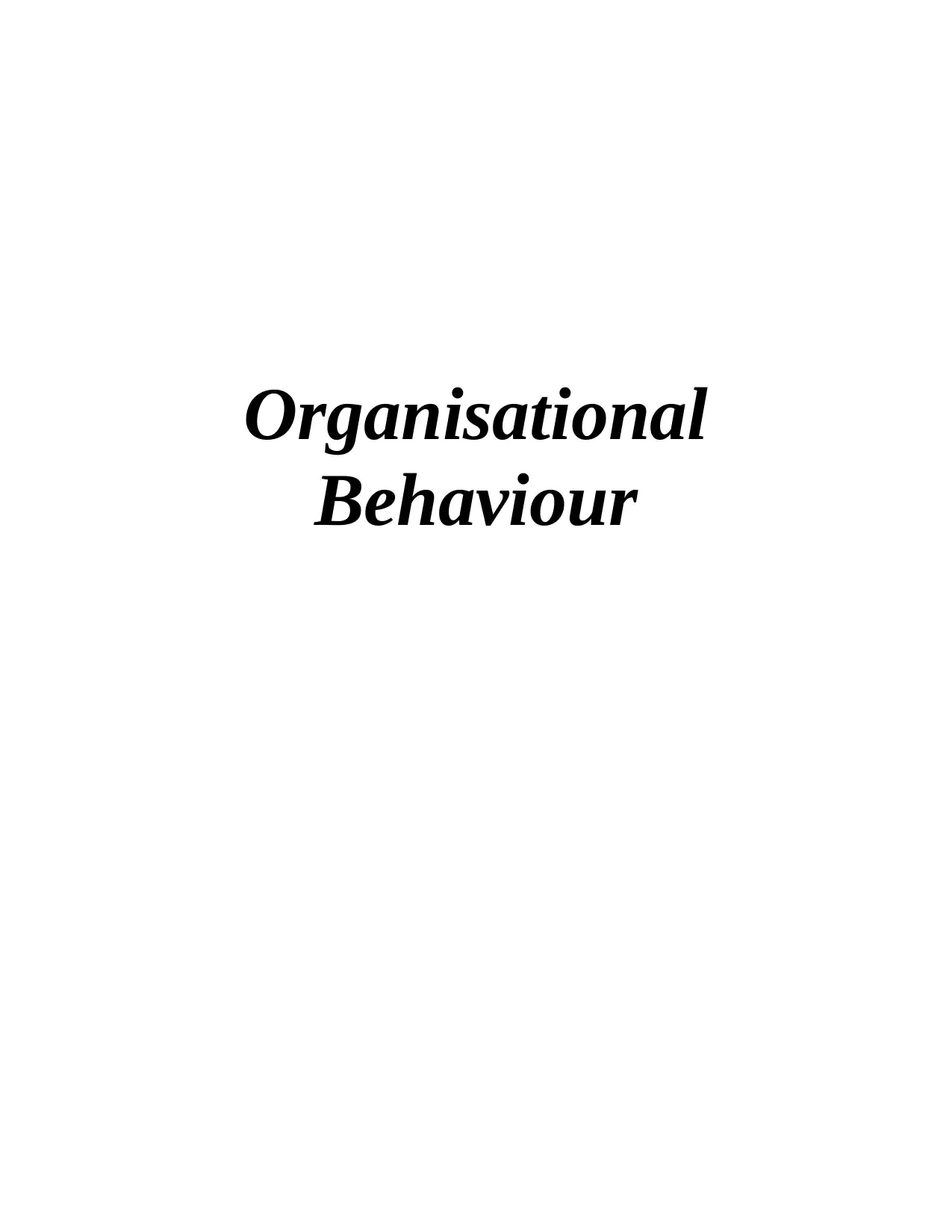
Organisational
Behaviour
Behaviour
Paraphrase This Document
Need a fresh take? Get an instant paraphrase of this document with our AI Paraphraser
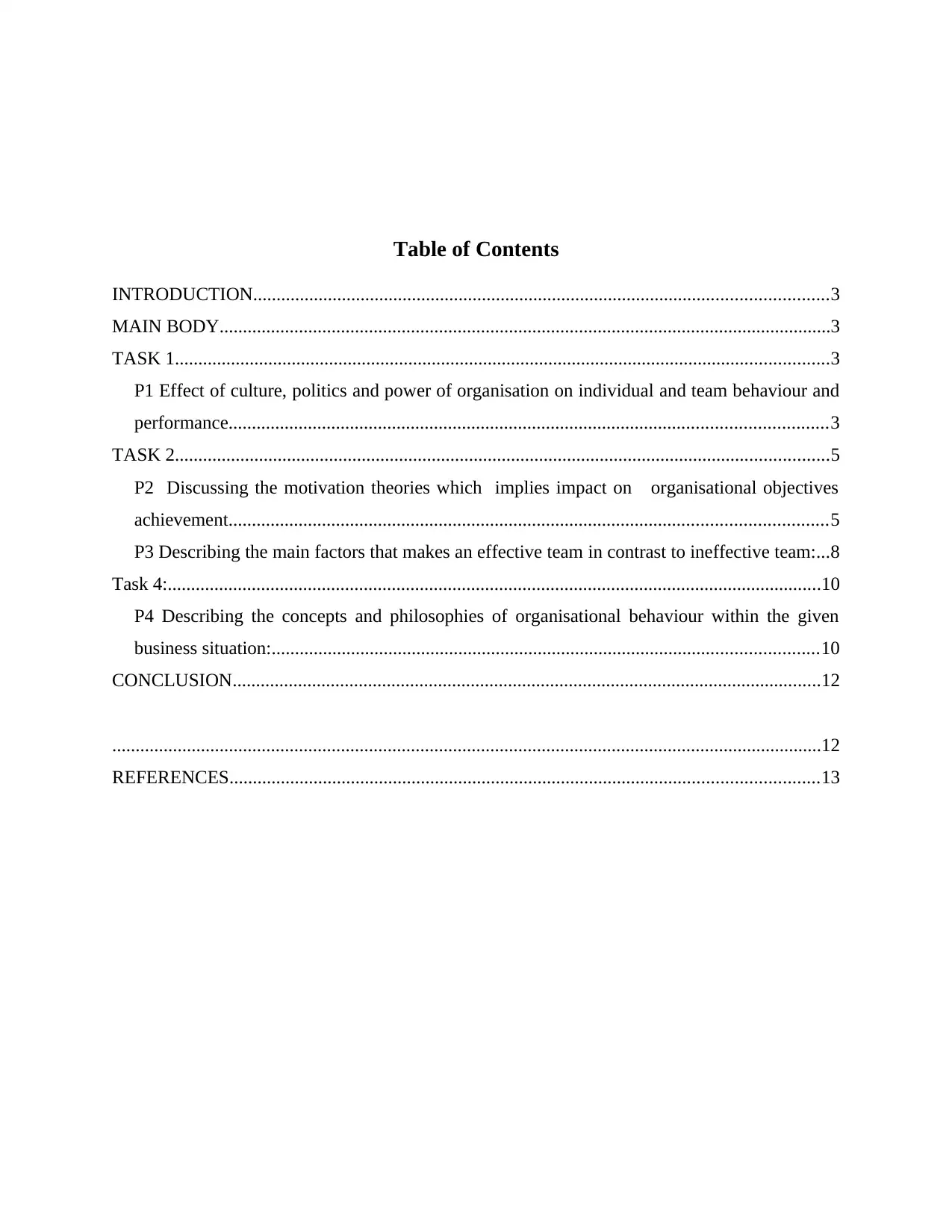
Table of Contents
INTRODUCTION...........................................................................................................................3
MAIN BODY...................................................................................................................................3
TASK 1............................................................................................................................................3
P1 Effect of culture, politics and power of organisation on individual and team behaviour and
performance................................................................................................................................3
TASK 2............................................................................................................................................5
P2 Discussing the motivation theories which implies impact on organisational objectives
achievement................................................................................................................................5
P3 Describing the main factors that makes an effective team in contrast to ineffective team:...8
Task 4:............................................................................................................................................10
P4 Describing the concepts and philosophies of organisational behaviour within the given
business situation:.....................................................................................................................10
CONCLUSION..............................................................................................................................12
........................................................................................................................................................12
REFERENCES..............................................................................................................................13
INTRODUCTION...........................................................................................................................3
MAIN BODY...................................................................................................................................3
TASK 1............................................................................................................................................3
P1 Effect of culture, politics and power of organisation on individual and team behaviour and
performance................................................................................................................................3
TASK 2............................................................................................................................................5
P2 Discussing the motivation theories which implies impact on organisational objectives
achievement................................................................................................................................5
P3 Describing the main factors that makes an effective team in contrast to ineffective team:...8
Task 4:............................................................................................................................................10
P4 Describing the concepts and philosophies of organisational behaviour within the given
business situation:.....................................................................................................................10
CONCLUSION..............................................................................................................................12
........................................................................................................................................................12
REFERENCES..............................................................................................................................13
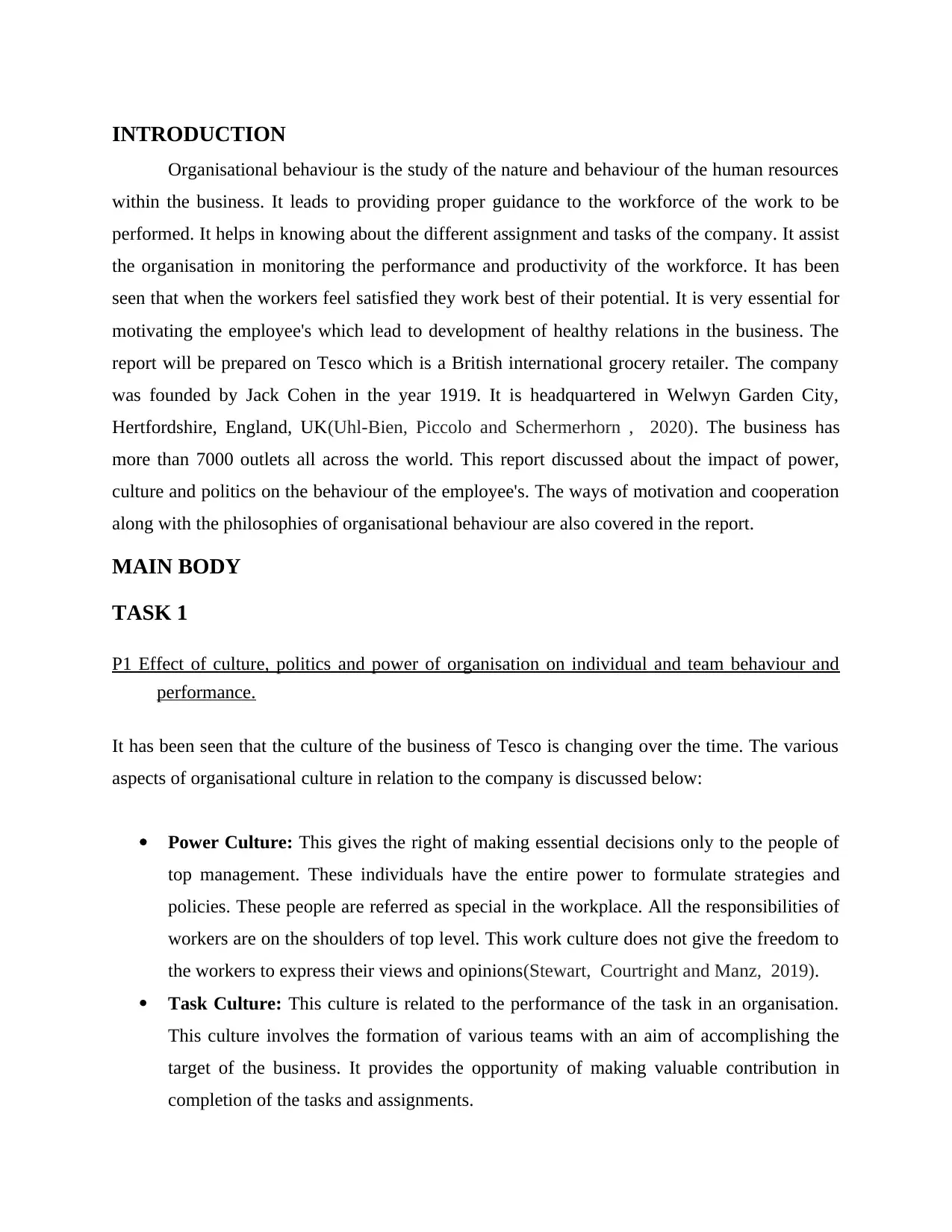
INTRODUCTION
Organisational behaviour is the study of the nature and behaviour of the human resources
within the business. It leads to providing proper guidance to the workforce of the work to be
performed. It helps in knowing about the different assignment and tasks of the company. It assist
the organisation in monitoring the performance and productivity of the workforce. It has been
seen that when the workers feel satisfied they work best of their potential. It is very essential for
motivating the employee's which lead to development of healthy relations in the business. The
report will be prepared on Tesco which is a British international grocery retailer. The company
was founded by Jack Cohen in the year 1919. It is headquartered in Welwyn Garden City,
Hertfordshire, England, UK(Uhl-Bien, Piccolo and Schermerhorn , 2020). The business has
more than 7000 outlets all across the world. This report discussed about the impact of power,
culture and politics on the behaviour of the employee's. The ways of motivation and cooperation
along with the philosophies of organisational behaviour are also covered in the report.
MAIN BODY
TASK 1
P1 Effect of culture, politics and power of organisation on individual and team behaviour and
performance.
It has been seen that the culture of the business of Tesco is changing over the time. The various
aspects of organisational culture in relation to the company is discussed below:
Power Culture: This gives the right of making essential decisions only to the people of
top management. These individuals have the entire power to formulate strategies and
policies. These people are referred as special in the workplace. All the responsibilities of
workers are on the shoulders of top level. This work culture does not give the freedom to
the workers to express their views and opinions(Stewart, Courtright and Manz, 2019).
Task Culture: This culture is related to the performance of the task in an organisation.
This culture involves the formation of various teams with an aim of accomplishing the
target of the business. It provides the opportunity of making valuable contribution in
completion of the tasks and assignments.
Organisational behaviour is the study of the nature and behaviour of the human resources
within the business. It leads to providing proper guidance to the workforce of the work to be
performed. It helps in knowing about the different assignment and tasks of the company. It assist
the organisation in monitoring the performance and productivity of the workforce. It has been
seen that when the workers feel satisfied they work best of their potential. It is very essential for
motivating the employee's which lead to development of healthy relations in the business. The
report will be prepared on Tesco which is a British international grocery retailer. The company
was founded by Jack Cohen in the year 1919. It is headquartered in Welwyn Garden City,
Hertfordshire, England, UK(Uhl-Bien, Piccolo and Schermerhorn , 2020). The business has
more than 7000 outlets all across the world. This report discussed about the impact of power,
culture and politics on the behaviour of the employee's. The ways of motivation and cooperation
along with the philosophies of organisational behaviour are also covered in the report.
MAIN BODY
TASK 1
P1 Effect of culture, politics and power of organisation on individual and team behaviour and
performance.
It has been seen that the culture of the business of Tesco is changing over the time. The various
aspects of organisational culture in relation to the company is discussed below:
Power Culture: This gives the right of making essential decisions only to the people of
top management. These individuals have the entire power to formulate strategies and
policies. These people are referred as special in the workplace. All the responsibilities of
workers are on the shoulders of top level. This work culture does not give the freedom to
the workers to express their views and opinions(Stewart, Courtright and Manz, 2019).
Task Culture: This culture is related to the performance of the task in an organisation.
This culture involves the formation of various teams with an aim of accomplishing the
target of the business. It provides the opportunity of making valuable contribution in
completion of the tasks and assignments.
⊘ This is a preview!⊘
Do you want full access?
Subscribe today to unlock all pages.

Trusted by 1+ million students worldwide
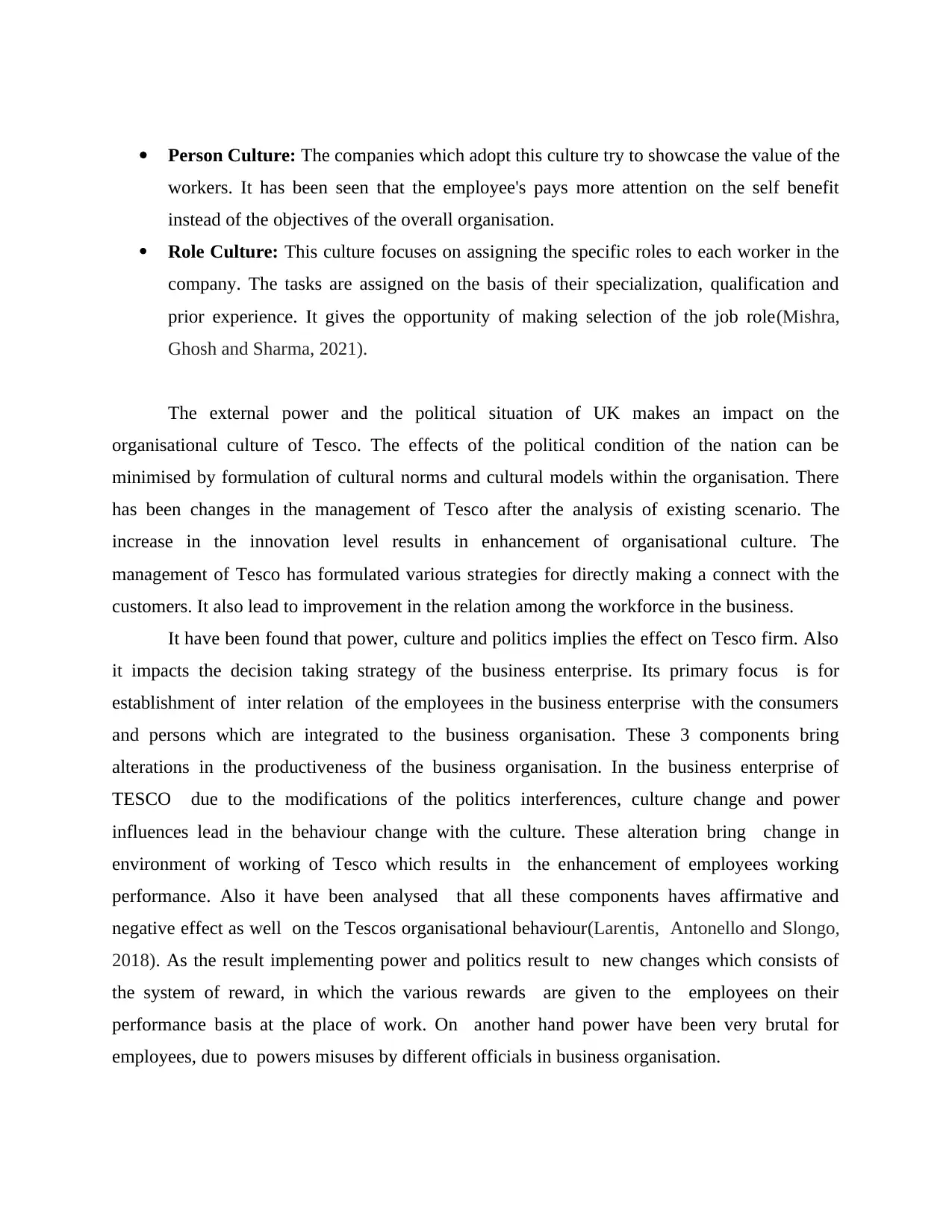
Person Culture: The companies which adopt this culture try to showcase the value of the
workers. It has been seen that the employee's pays more attention on the self benefit
instead of the objectives of the overall organisation.
Role Culture: This culture focuses on assigning the specific roles to each worker in the
company. The tasks are assigned on the basis of their specialization, qualification and
prior experience. It gives the opportunity of making selection of the job role(Mishra,
Ghosh and Sharma, 2021).
The external power and the political situation of UK makes an impact on the
organisational culture of Tesco. The effects of the political condition of the nation can be
minimised by formulation of cultural norms and cultural models within the organisation. There
has been changes in the management of Tesco after the analysis of existing scenario. The
increase in the innovation level results in enhancement of organisational culture. The
management of Tesco has formulated various strategies for directly making a connect with the
customers. It also lead to improvement in the relation among the workforce in the business.
It have been found that power, culture and politics implies the effect on Tesco firm. Also
it impacts the decision taking strategy of the business enterprise. Its primary focus is for
establishment of inter relation of the employees in the business enterprise with the consumers
and persons which are integrated to the business organisation. These 3 components bring
alterations in the productiveness of the business organisation. In the business enterprise of
TESCO due to the modifications of the politics interferences, culture change and power
influences lead in the behaviour change with the culture. These alteration bring change in
environment of working of Tesco which results in the enhancement of employees working
performance. Also it have been analysed that all these components haves affirmative and
negative effect as well on the Tescos organisational behaviour(Larentis, Antonello and Slongo,
2018). As the result implementing power and politics result to new changes which consists of
the system of reward, in which the various rewards are given to the employees on their
performance basis at the place of work. On another hand power have been very brutal for
employees, due to powers misuses by different officials in business organisation.
workers. It has been seen that the employee's pays more attention on the self benefit
instead of the objectives of the overall organisation.
Role Culture: This culture focuses on assigning the specific roles to each worker in the
company. The tasks are assigned on the basis of their specialization, qualification and
prior experience. It gives the opportunity of making selection of the job role(Mishra,
Ghosh and Sharma, 2021).
The external power and the political situation of UK makes an impact on the
organisational culture of Tesco. The effects of the political condition of the nation can be
minimised by formulation of cultural norms and cultural models within the organisation. There
has been changes in the management of Tesco after the analysis of existing scenario. The
increase in the innovation level results in enhancement of organisational culture. The
management of Tesco has formulated various strategies for directly making a connect with the
customers. It also lead to improvement in the relation among the workforce in the business.
It have been found that power, culture and politics implies the effect on Tesco firm. Also
it impacts the decision taking strategy of the business enterprise. Its primary focus is for
establishment of inter relation of the employees in the business enterprise with the consumers
and persons which are integrated to the business organisation. These 3 components bring
alterations in the productiveness of the business organisation. In the business enterprise of
TESCO due to the modifications of the politics interferences, culture change and power
influences lead in the behaviour change with the culture. These alteration bring change in
environment of working of Tesco which results in the enhancement of employees working
performance. Also it have been analysed that all these components haves affirmative and
negative effect as well on the Tescos organisational behaviour(Larentis, Antonello and Slongo,
2018). As the result implementing power and politics result to new changes which consists of
the system of reward, in which the various rewards are given to the employees on their
performance basis at the place of work. On another hand power have been very brutal for
employees, due to powers misuses by different officials in business organisation.
Paraphrase This Document
Need a fresh take? Get an instant paraphrase of this document with our AI Paraphraser
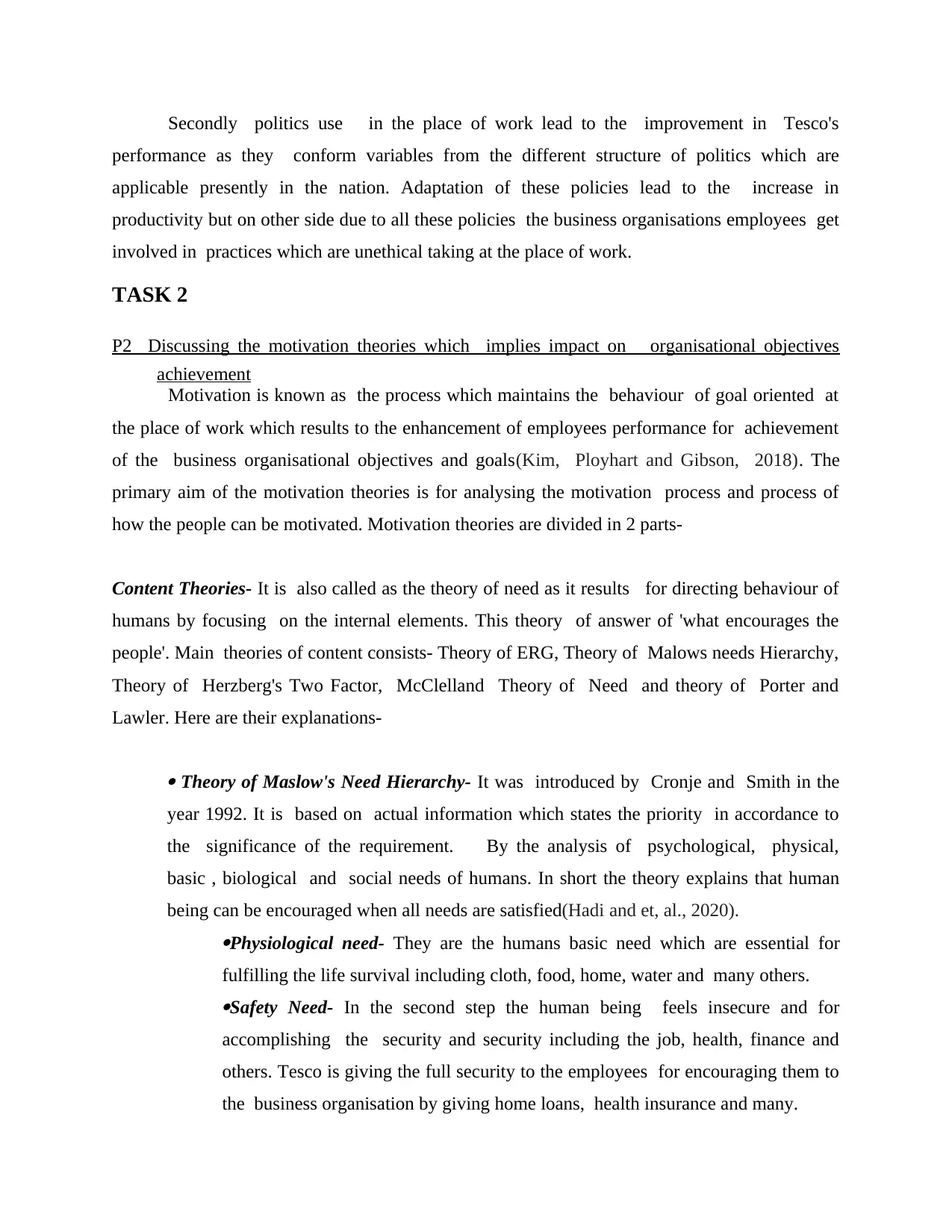
Secondly politics use in the place of work lead to the improvement in Tesco's
performance as they conform variables from the different structure of politics which are
applicable presently in the nation. Adaptation of these policies lead to the increase in
productivity but on other side due to all these policies the business organisations employees get
involved in practices which are unethical taking at the place of work.
TASK 2
P2 Discussing the motivation theories which implies impact on organisational objectives
achievement
Motivation is known as the process which maintains the behaviour of goal oriented at
the place of work which results to the enhancement of employees performance for achievement
of the business organisational objectives and goals(Kim, Ployhart and Gibson, 2018). The
primary aim of the motivation theories is for analysing the motivation process and process of
how the people can be motivated. Motivation theories are divided in 2 parts-
Content Theories- It is also called as the theory of need as it results for directing behaviour of
humans by focusing on the internal elements. This theory of answer of 'what encourages the
people'. Main theories of content consists- Theory of ERG, Theory of Malows needs Hierarchy,
Theory of Herzberg's Two Factor, McClelland Theory of Need and theory of Porter and
Lawler. Here are their explanations-
Theory of Maslow's Need Hierarchy- It was introduced by Cronje and Smith in the
year 1992. It is based on actual information which states the priority in accordance to
the significance of the requirement. By the analysis of psychological, physical,
basic , biological and social needs of humans. In short the theory explains that human
being can be encouraged when all needs are satisfied(Hadi and et, al., 2020).
Physiological need- They are the humans basic need which are essential for
fulfilling the life survival including cloth, food, home, water and many others.
Safety Need- In the second step the human being feels insecure and for
accomplishing the security and security including the job, health, finance and
others. Tesco is giving the full security to the employees for encouraging them to
the business organisation by giving home loans, health insurance and many.
performance as they conform variables from the different structure of politics which are
applicable presently in the nation. Adaptation of these policies lead to the increase in
productivity but on other side due to all these policies the business organisations employees get
involved in practices which are unethical taking at the place of work.
TASK 2
P2 Discussing the motivation theories which implies impact on organisational objectives
achievement
Motivation is known as the process which maintains the behaviour of goal oriented at
the place of work which results to the enhancement of employees performance for achievement
of the business organisational objectives and goals(Kim, Ployhart and Gibson, 2018). The
primary aim of the motivation theories is for analysing the motivation process and process of
how the people can be motivated. Motivation theories are divided in 2 parts-
Content Theories- It is also called as the theory of need as it results for directing behaviour of
humans by focusing on the internal elements. This theory of answer of 'what encourages the
people'. Main theories of content consists- Theory of ERG, Theory of Malows needs Hierarchy,
Theory of Herzberg's Two Factor, McClelland Theory of Need and theory of Porter and
Lawler. Here are their explanations-
Theory of Maslow's Need Hierarchy- It was introduced by Cronje and Smith in the
year 1992. It is based on actual information which states the priority in accordance to
the significance of the requirement. By the analysis of psychological, physical,
basic , biological and social needs of humans. In short the theory explains that human
being can be encouraged when all needs are satisfied(Hadi and et, al., 2020).
Physiological need- They are the humans basic need which are essential for
fulfilling the life survival including cloth, food, home, water and many others.
Safety Need- In the second step the human being feels insecure and for
accomplishing the security and security including the job, health, finance and
others. Tesco is giving the full security to the employees for encouraging them to
the business organisation by giving home loans, health insurance and many.
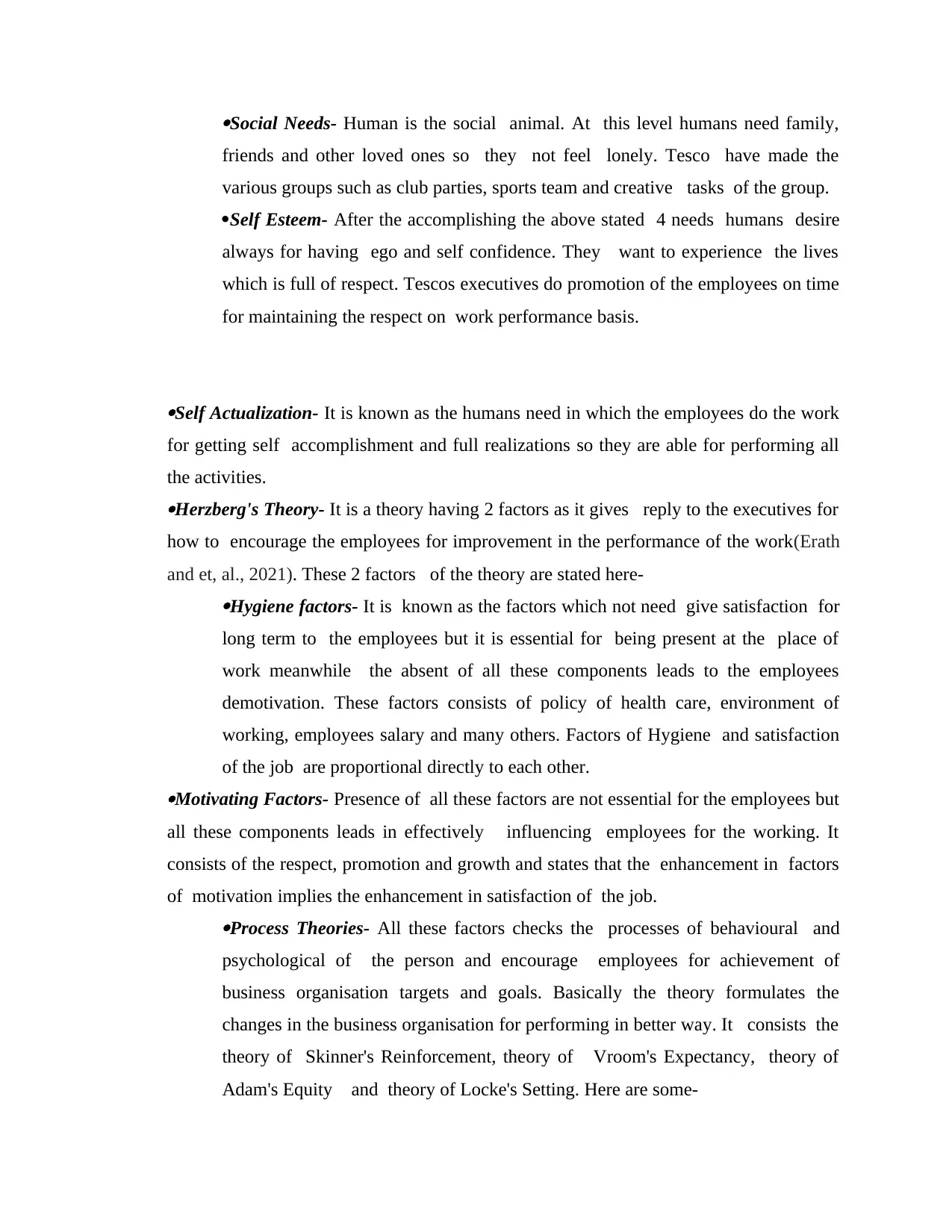
Social Needs- Human is the social animal. At this level humans need family,
friends and other loved ones so they not feel lonely. Tesco have made the
various groups such as club parties, sports team and creative tasks of the group.
Self Esteem- After the accomplishing the above stated 4 needs humans desire
always for having ego and self confidence. They want to experience the lives
which is full of respect. Tescos executives do promotion of the employees on time
for maintaining the respect on work performance basis.
Self Actualization- It is known as the humans need in which the employees do the work
for getting self accomplishment and full realizations so they are able for performing all
the activities.
Herzberg's Theory- It is a theory having 2 factors as it gives reply to the executives for
how to encourage the employees for improvement in the performance of the work(Erath
and et, al., 2021). These 2 factors of the theory are stated here-
Hygiene factors- It is known as the factors which not need give satisfaction for
long term to the employees but it is essential for being present at the place of
work meanwhile the absent of all these components leads to the employees
demotivation. These factors consists of policy of health care, environment of
working, employees salary and many others. Factors of Hygiene and satisfaction
of the job are proportional directly to each other.
Motivating Factors- Presence of all these factors are not essential for the employees but
all these components leads in effectively influencing employees for the working. It
consists of the respect, promotion and growth and states that the enhancement in factors
of motivation implies the enhancement in satisfaction of the job.
Process Theories- All these factors checks the processes of behavioural and
psychological of the person and encourage employees for achievement of
business organisation targets and goals. Basically the theory formulates the
changes in the business organisation for performing in better way. It consists the
theory of Skinner's Reinforcement, theory of Vroom's Expectancy, theory of
Adam's Equity and theory of Locke's Setting. Here are some-
friends and other loved ones so they not feel lonely. Tesco have made the
various groups such as club parties, sports team and creative tasks of the group.
Self Esteem- After the accomplishing the above stated 4 needs humans desire
always for having ego and self confidence. They want to experience the lives
which is full of respect. Tescos executives do promotion of the employees on time
for maintaining the respect on work performance basis.
Self Actualization- It is known as the humans need in which the employees do the work
for getting self accomplishment and full realizations so they are able for performing all
the activities.
Herzberg's Theory- It is a theory having 2 factors as it gives reply to the executives for
how to encourage the employees for improvement in the performance of the work(Erath
and et, al., 2021). These 2 factors of the theory are stated here-
Hygiene factors- It is known as the factors which not need give satisfaction for
long term to the employees but it is essential for being present at the place of
work meanwhile the absent of all these components leads to the employees
demotivation. These factors consists of policy of health care, environment of
working, employees salary and many others. Factors of Hygiene and satisfaction
of the job are proportional directly to each other.
Motivating Factors- Presence of all these factors are not essential for the employees but
all these components leads in effectively influencing employees for the working. It
consists of the respect, promotion and growth and states that the enhancement in factors
of motivation implies the enhancement in satisfaction of the job.
Process Theories- All these factors checks the processes of behavioural and
psychological of the person and encourage employees for achievement of
business organisation targets and goals. Basically the theory formulates the
changes in the business organisation for performing in better way. It consists the
theory of Skinner's Reinforcement, theory of Vroom's Expectancy, theory of
Adam's Equity and theory of Locke's Setting. Here are some-
⊘ This is a preview!⊘
Do you want full access?
Subscribe today to unlock all pages.

Trusted by 1+ million students worldwide
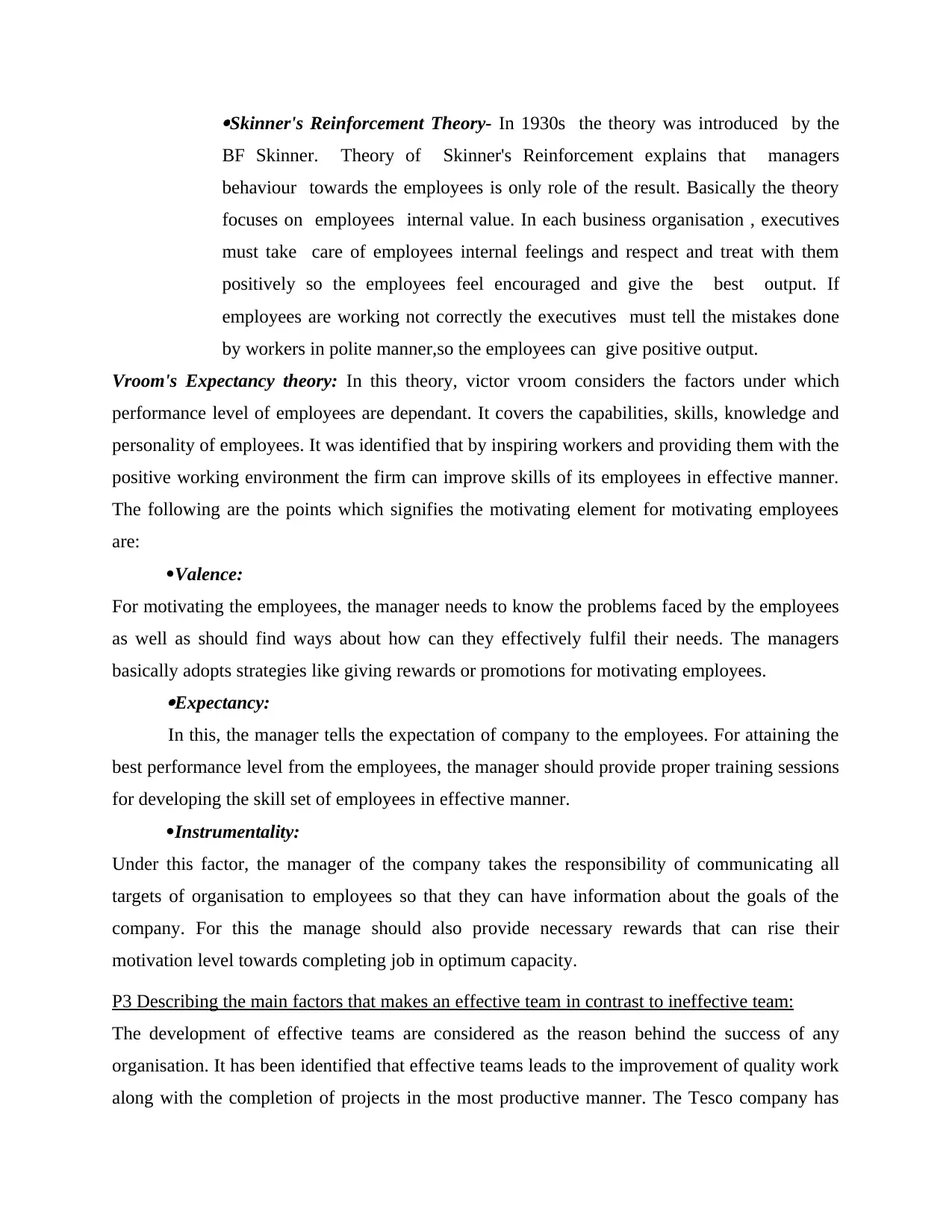
Skinner's Reinforcement Theory- In 1930s the theory was introduced by the
BF Skinner. Theory of Skinner's Reinforcement explains that managers
behaviour towards the employees is only role of the result. Basically the theory
focuses on employees internal value. In each business organisation , executives
must take care of employees internal feelings and respect and treat with them
positively so the employees feel encouraged and give the best output. If
employees are working not correctly the executives must tell the mistakes done
by workers in polite manner,so the employees can give positive output.
Vroom's Expectancy theory: In this theory, victor vroom considers the factors under which
performance level of employees are dependant. It covers the capabilities, skills, knowledge and
personality of employees. It was identified that by inspiring workers and providing them with the
positive working environment the firm can improve skills of its employees in effective manner.
The following are the points which signifies the motivating element for motivating employees
are:
Valence:
For motivating the employees, the manager needs to know the problems faced by the employees
as well as should find ways about how can they effectively fulfil their needs. The managers
basically adopts strategies like giving rewards or promotions for motivating employees.
Expectancy:
In this, the manager tells the expectation of company to the employees. For attaining the
best performance level from the employees, the manager should provide proper training sessions
for developing the skill set of employees in effective manner.
Instrumentality:
Under this factor, the manager of the company takes the responsibility of communicating all
targets of organisation to employees so that they can have information about the goals of the
company. For this the manage should also provide necessary rewards that can rise their
motivation level towards completing job in optimum capacity.
P3 Describing the main factors that makes an effective team in contrast to ineffective team:
The development of effective teams are considered as the reason behind the success of any
organisation. It has been identified that effective teams leads to the improvement of quality work
along with the completion of projects in the most productive manner. The Tesco company has
BF Skinner. Theory of Skinner's Reinforcement explains that managers
behaviour towards the employees is only role of the result. Basically the theory
focuses on employees internal value. In each business organisation , executives
must take care of employees internal feelings and respect and treat with them
positively so the employees feel encouraged and give the best output. If
employees are working not correctly the executives must tell the mistakes done
by workers in polite manner,so the employees can give positive output.
Vroom's Expectancy theory: In this theory, victor vroom considers the factors under which
performance level of employees are dependant. It covers the capabilities, skills, knowledge and
personality of employees. It was identified that by inspiring workers and providing them with the
positive working environment the firm can improve skills of its employees in effective manner.
The following are the points which signifies the motivating element for motivating employees
are:
Valence:
For motivating the employees, the manager needs to know the problems faced by the employees
as well as should find ways about how can they effectively fulfil their needs. The managers
basically adopts strategies like giving rewards or promotions for motivating employees.
Expectancy:
In this, the manager tells the expectation of company to the employees. For attaining the
best performance level from the employees, the manager should provide proper training sessions
for developing the skill set of employees in effective manner.
Instrumentality:
Under this factor, the manager of the company takes the responsibility of communicating all
targets of organisation to employees so that they can have information about the goals of the
company. For this the manage should also provide necessary rewards that can rise their
motivation level towards completing job in optimum capacity.
P3 Describing the main factors that makes an effective team in contrast to ineffective team:
The development of effective teams are considered as the reason behind the success of any
organisation. It has been identified that effective teams leads to the improvement of quality work
along with the completion of projects in the most productive manner. The Tesco company has
Paraphrase This Document
Need a fresh take? Get an instant paraphrase of this document with our AI Paraphraser
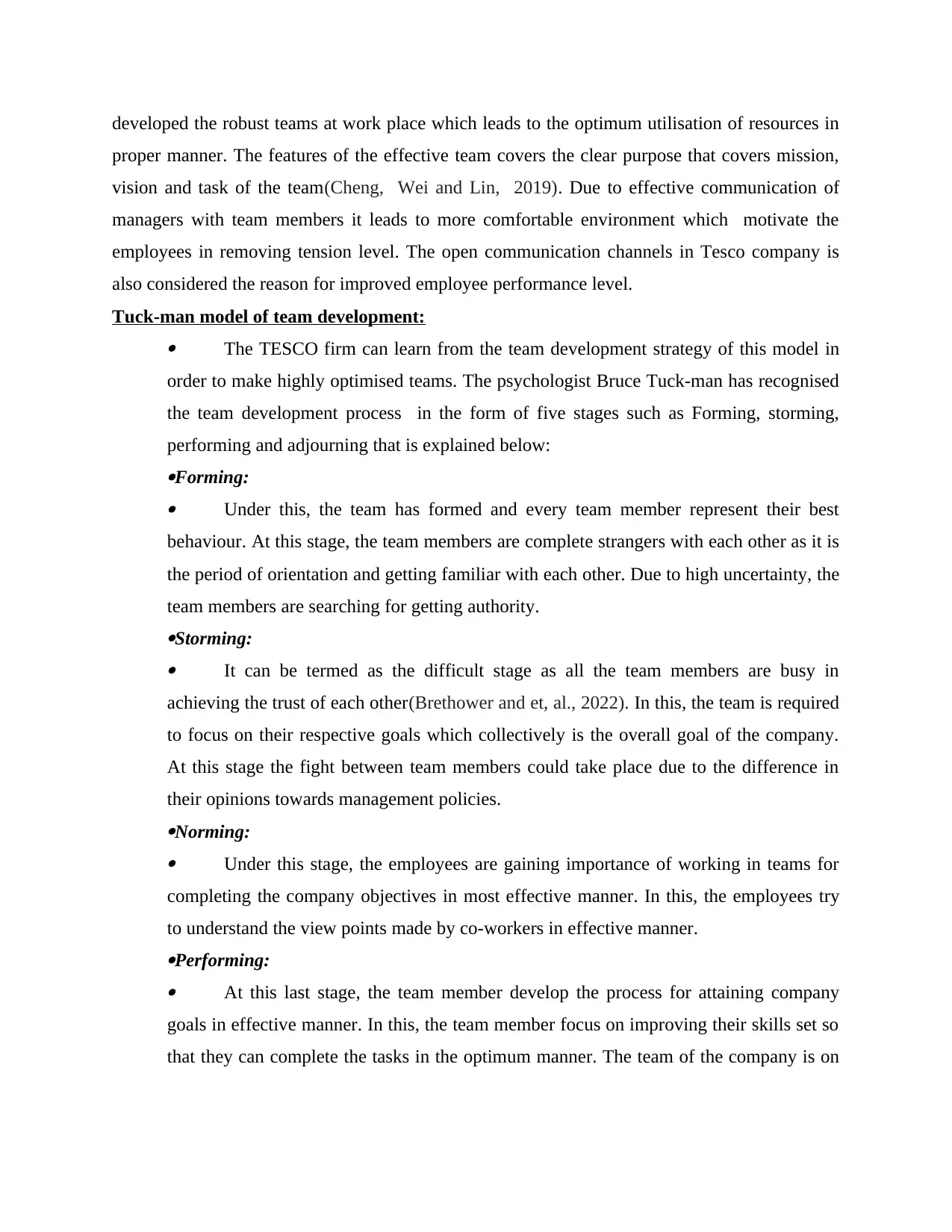
developed the robust teams at work place which leads to the optimum utilisation of resources in
proper manner. The features of the effective team covers the clear purpose that covers mission,
vision and task of the team(Cheng, Wei and Lin, 2019). Due to effective communication of
managers with team members it leads to more comfortable environment which motivate the
employees in removing tension level. The open communication channels in Tesco company is
also considered the reason for improved employee performance level.
Tuck-man model of team development:
The TESCO firm can learn from the team development strategy of this model in
order to make highly optimised teams. The psychologist Bruce Tuck-man has recognised
the team development process in the form of five stages such as Forming, storming,
performing and adjourning that is explained below:
Forming:
Under this, the team has formed and every team member represent their best
behaviour. At this stage, the team members are complete strangers with each other as it is
the period of orientation and getting familiar with each other. Due to high uncertainty, the
team members are searching for getting authority.
Storming:
It can be termed as the difficult stage as all the team members are busy in
achieving the trust of each other(Brethower and et, al., 2022). In this, the team is required
to focus on their respective goals which collectively is the overall goal of the company.
At this stage the fight between team members could take place due to the difference in
their opinions towards management policies.
Norming:
Under this stage, the employees are gaining importance of working in teams for
completing the company objectives in most effective manner. In this, the employees try
to understand the view points made by co-workers in effective manner.
Performing:
At this last stage, the team member develop the process for attaining company
goals in effective manner. In this, the team member focus on improving their skills set so
that they can complete the tasks in the optimum manner. The team of the company is on
proper manner. The features of the effective team covers the clear purpose that covers mission,
vision and task of the team(Cheng, Wei and Lin, 2019). Due to effective communication of
managers with team members it leads to more comfortable environment which motivate the
employees in removing tension level. The open communication channels in Tesco company is
also considered the reason for improved employee performance level.
Tuck-man model of team development:
The TESCO firm can learn from the team development strategy of this model in
order to make highly optimised teams. The psychologist Bruce Tuck-man has recognised
the team development process in the form of five stages such as Forming, storming,
performing and adjourning that is explained below:
Forming:
Under this, the team has formed and every team member represent their best
behaviour. At this stage, the team members are complete strangers with each other as it is
the period of orientation and getting familiar with each other. Due to high uncertainty, the
team members are searching for getting authority.
Storming:
It can be termed as the difficult stage as all the team members are busy in
achieving the trust of each other(Brethower and et, al., 2022). In this, the team is required
to focus on their respective goals which collectively is the overall goal of the company.
At this stage the fight between team members could take place due to the difference in
their opinions towards management policies.
Norming:
Under this stage, the employees are gaining importance of working in teams for
completing the company objectives in most effective manner. In this, the employees try
to understand the view points made by co-workers in effective manner.
Performing:
At this last stage, the team member develop the process for attaining company
goals in effective manner. In this, the team member focus on improving their skills set so
that they can complete the tasks in the optimum manner. The team of the company is on
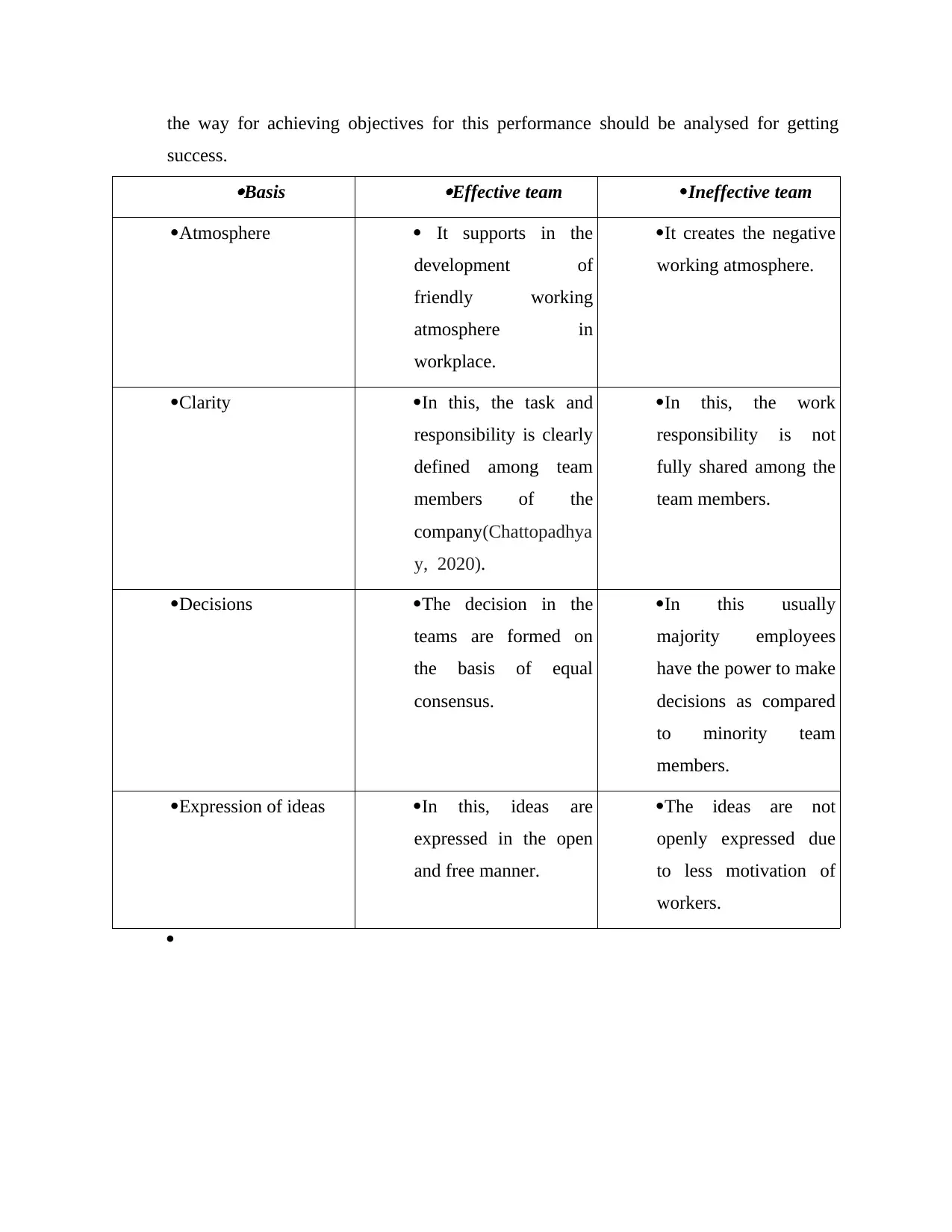
the way for achieving objectives for this performance should be analysed for getting
success.
Basis
Effective team Ineffective team
Atmosphere It supports in the
development of
friendly working
atmosphere in
workplace.
It creates the negative
working atmosphere.
Clarity In this, the task and
responsibility is clearly
defined among team
members of the
company(Chattopadhya
y, 2020).
In this, the work
responsibility is not
fully shared among the
team members.
Decisions The decision in the
teams are formed on
the basis of equal
consensus.
In this usually
majority employees
have the power to make
decisions as compared
to minority team
members.
Expression of ideas In this, ideas are
expressed in the open
and free manner.
The ideas are not
openly expressed due
to less motivation of
workers.
success.
Basis
Effective team Ineffective team
Atmosphere It supports in the
development of
friendly working
atmosphere in
workplace.
It creates the negative
working atmosphere.
Clarity In this, the task and
responsibility is clearly
defined among team
members of the
company(Chattopadhya
y, 2020).
In this, the work
responsibility is not
fully shared among the
team members.
Decisions The decision in the
teams are formed on
the basis of equal
consensus.
In this usually
majority employees
have the power to make
decisions as compared
to minority team
members.
Expression of ideas In this, ideas are
expressed in the open
and free manner.
The ideas are not
openly expressed due
to less motivation of
workers.
⊘ This is a preview!⊘
Do you want full access?
Subscribe today to unlock all pages.

Trusted by 1+ million students worldwide
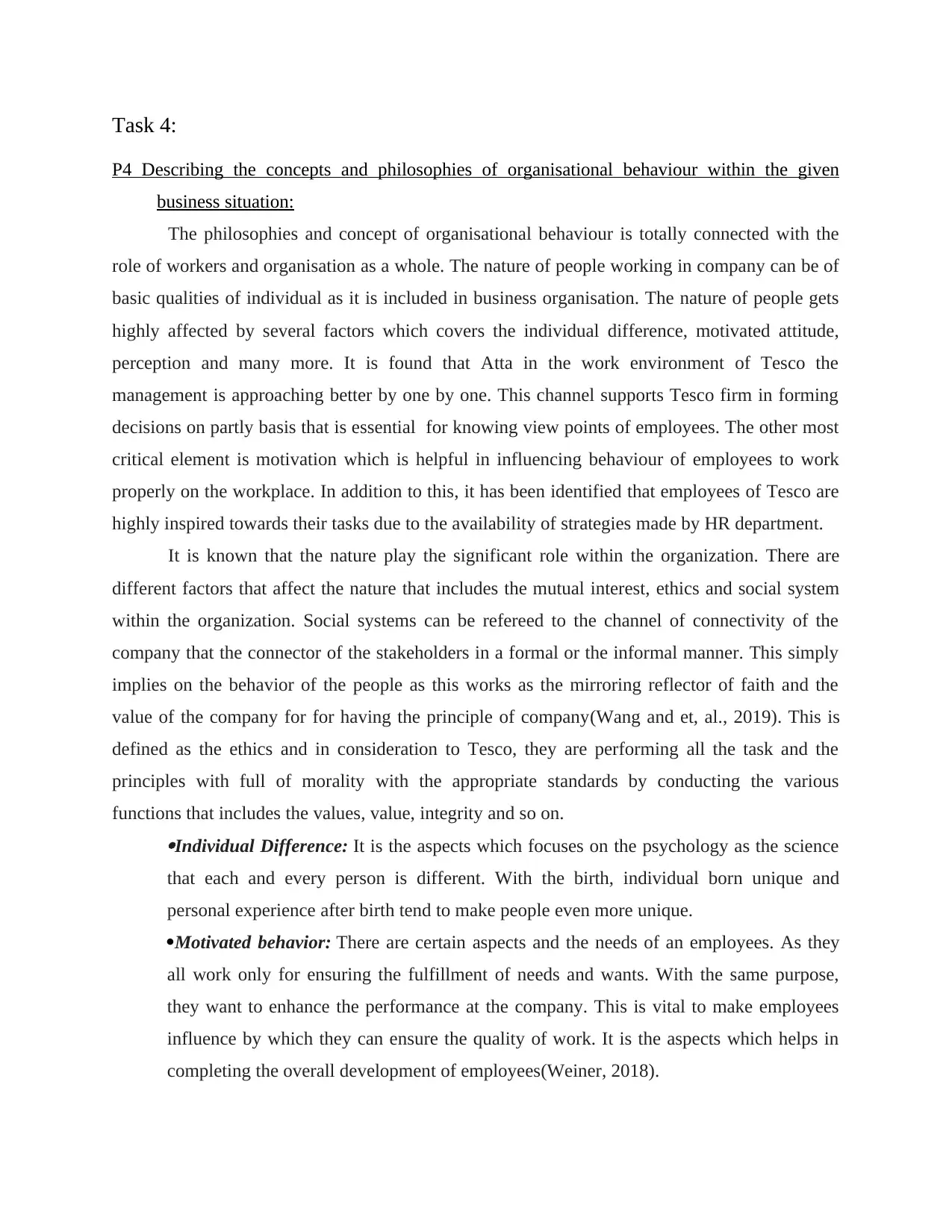
Task 4:
P4 Describing the concepts and philosophies of organisational behaviour within the given
business situation:
The philosophies and concept of organisational behaviour is totally connected with the
role of workers and organisation as a whole. The nature of people working in company can be of
basic qualities of individual as it is included in business organisation. The nature of people gets
highly affected by several factors which covers the individual difference, motivated attitude,
perception and many more. It is found that Atta in the work environment of Tesco the
management is approaching better by one by one. This channel supports Tesco firm in forming
decisions on partly basis that is essential for knowing view points of employees. The other most
critical element is motivation which is helpful in influencing behaviour of employees to work
properly on the workplace. In addition to this, it has been identified that employees of Tesco are
highly inspired towards their tasks due to the availability of strategies made by HR department.
It is known that the nature play the significant role within the organization. There are
different factors that affect the nature that includes the mutual interest, ethics and social system
within the organization. Social systems can be refereed to the channel of connectivity of the
company that the connector of the stakeholders in a formal or the informal manner. This simply
implies on the behavior of the people as this works as the mirroring reflector of faith and the
value of the company for for having the principle of company(Wang and et, al., 2019). This is
defined as the ethics and in consideration to Tesco, they are performing all the task and the
principles with full of morality with the appropriate standards by conducting the various
functions that includes the values, value, integrity and so on.
Individual Difference: It is the aspects which focuses on the psychology as the science
that each and every person is different. With the birth, individual born unique and
personal experience after birth tend to make people even more unique.
Motivated behavior: There are certain aspects and the needs of an employees. As they
all work only for ensuring the fulfillment of needs and wants. With the same purpose,
they want to enhance the performance at the company. This is vital to make employees
influence by which they can ensure the quality of work. It is the aspects which helps in
completing the overall development of employees(Weiner, 2018).
P4 Describing the concepts and philosophies of organisational behaviour within the given
business situation:
The philosophies and concept of organisational behaviour is totally connected with the
role of workers and organisation as a whole. The nature of people working in company can be of
basic qualities of individual as it is included in business organisation. The nature of people gets
highly affected by several factors which covers the individual difference, motivated attitude,
perception and many more. It is found that Atta in the work environment of Tesco the
management is approaching better by one by one. This channel supports Tesco firm in forming
decisions on partly basis that is essential for knowing view points of employees. The other most
critical element is motivation which is helpful in influencing behaviour of employees to work
properly on the workplace. In addition to this, it has been identified that employees of Tesco are
highly inspired towards their tasks due to the availability of strategies made by HR department.
It is known that the nature play the significant role within the organization. There are
different factors that affect the nature that includes the mutual interest, ethics and social system
within the organization. Social systems can be refereed to the channel of connectivity of the
company that the connector of the stakeholders in a formal or the informal manner. This simply
implies on the behavior of the people as this works as the mirroring reflector of faith and the
value of the company for for having the principle of company(Wang and et, al., 2019). This is
defined as the ethics and in consideration to Tesco, they are performing all the task and the
principles with full of morality with the appropriate standards by conducting the various
functions that includes the values, value, integrity and so on.
Individual Difference: It is the aspects which focuses on the psychology as the science
that each and every person is different. With the birth, individual born unique and
personal experience after birth tend to make people even more unique.
Motivated behavior: There are certain aspects and the needs of an employees. As they
all work only for ensuring the fulfillment of needs and wants. With the same purpose,
they want to enhance the performance at the company. This is vital to make employees
influence by which they can ensure the quality of work. It is the aspects which helps in
completing the overall development of employees(Weiner, 2018).
Paraphrase This Document
Need a fresh take? Get an instant paraphrase of this document with our AI Paraphraser

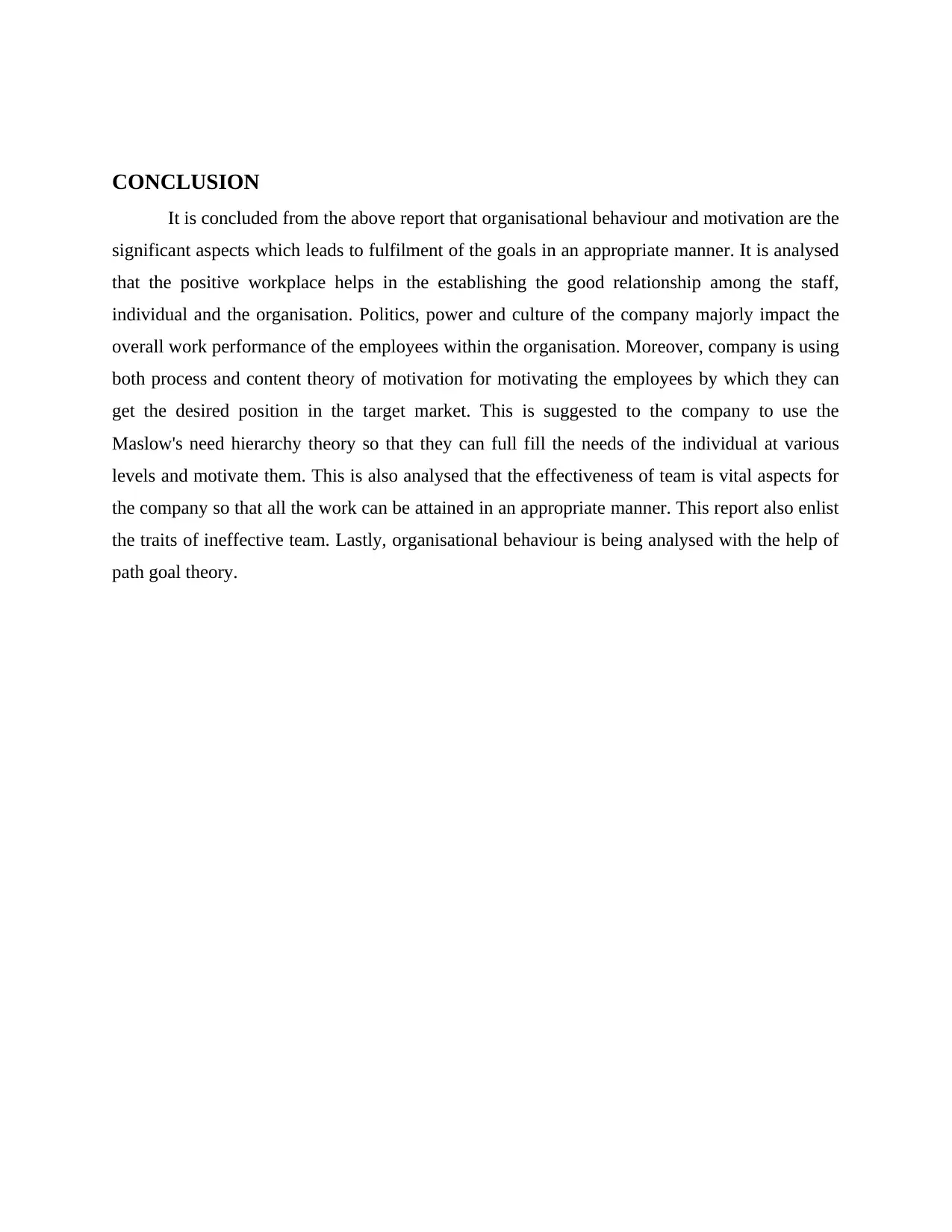
CONCLUSION
It is concluded from the above report that organisational behaviour and motivation are the
significant aspects which leads to fulfilment of the goals in an appropriate manner. It is analysed
that the positive workplace helps in the establishing the good relationship among the staff,
individual and the organisation. Politics, power and culture of the company majorly impact the
overall work performance of the employees within the organisation. Moreover, company is using
both process and content theory of motivation for motivating the employees by which they can
get the desired position in the target market. This is suggested to the company to use the
Maslow's need hierarchy theory so that they can full fill the needs of the individual at various
levels and motivate them. This is also analysed that the effectiveness of team is vital aspects for
the company so that all the work can be attained in an appropriate manner. This report also enlist
the traits of ineffective team. Lastly, organisational behaviour is being analysed with the help of
path goal theory.
It is concluded from the above report that organisational behaviour and motivation are the
significant aspects which leads to fulfilment of the goals in an appropriate manner. It is analysed
that the positive workplace helps in the establishing the good relationship among the staff,
individual and the organisation. Politics, power and culture of the company majorly impact the
overall work performance of the employees within the organisation. Moreover, company is using
both process and content theory of motivation for motivating the employees by which they can
get the desired position in the target market. This is suggested to the company to use the
Maslow's need hierarchy theory so that they can full fill the needs of the individual at various
levels and motivate them. This is also analysed that the effectiveness of team is vital aspects for
the company so that all the work can be attained in an appropriate manner. This report also enlist
the traits of ineffective team. Lastly, organisational behaviour is being analysed with the help of
path goal theory.
⊘ This is a preview!⊘
Do you want full access?
Subscribe today to unlock all pages.

Trusted by 1+ million students worldwide
1 out of 13
Related Documents
Your All-in-One AI-Powered Toolkit for Academic Success.
+13062052269
info@desklib.com
Available 24*7 on WhatsApp / Email
![[object Object]](/_next/static/media/star-bottom.7253800d.svg)
Unlock your academic potential
Copyright © 2020–2026 A2Z Services. All Rights Reserved. Developed and managed by ZUCOL.




